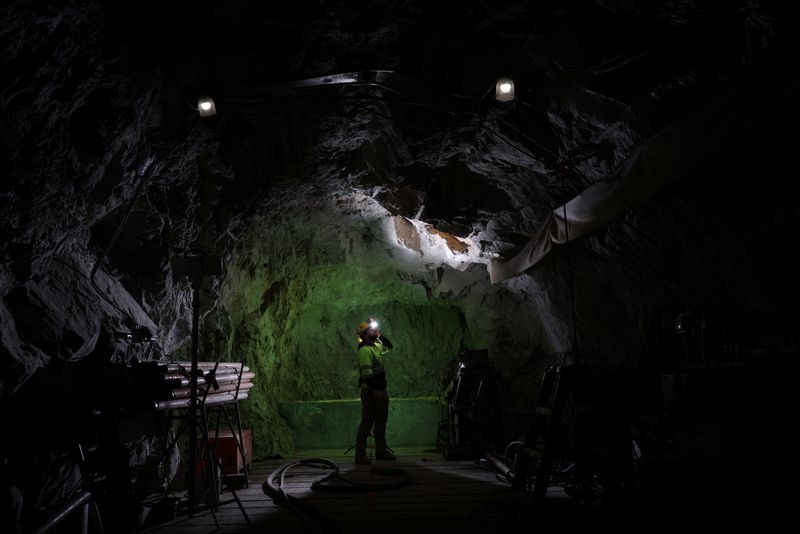By Clara Denina , Helen Reid and Ernest Scheyder
(Reuters) - University of Kentucky undergraduate Jonathan Little is among the legions of students around the world that the mining industry cannot afford to lose, but already has.
Little, 20, considered a career in mining, but chose instead to study a branch of engineering that will likely have him designing truck engines. That was much more appealing to him than working in a coal mine, like many of his university peers do after graduation.
"That's not a career path I want," said Little.
Choices made by Little and other students foreshadow a talent crunch for the mining industry as it braces for a wave of retirements from aging workers. Later this decade, fewer graduates will have the skills needed to build and run mines producing lithium, nickel, copper and other metals to feed ravenous makers of electric vehicles, solar panels and other renewable-energy technologies.
Enrollment in U.S. mining engineering programs dropped 46% between 2015 and 2020, according to a survey by the Society for Mining, Metallurgy and Exploration (SMME). The same problem afflicts major mining countries such as Canada, South Africa and Australia.
"We are going to end up with untrained people to run mines at a time when you really need to mine for the EV transition," said Mike Armitage, who sits on the board of fluorspar miner Tertiary Minerals Plc.
The talent crunch is hitting just as automakers are gearing up to build millions of electric vehicles. Many plan to have fully electric fleets by 2030. Batteries and wiring for all those engines will require major boosts in metals production.
Many students are spooked, professors and industry executives say, by mining's historical reputation as a dangerous industry that pollutes the environment. That stereotype was reinforced just three years ago when 270 people died after the collapse of a tailings dam owned by Vale SA at an iron ore mine in Brazil.
AGING WORKFORCE
More than half of miners are over the age of 45 and 20% are over 60 and closing in on retirement, according to a study from Mercer. The U.S. government is forming a committee to address "public perceptions about the nature of mining" and its aging workforce.
Meanwhile, the China University of Mining and Technology - considered that country's best mining school - enrolled more mining engineering students in 2020 than the entire United States, largely to supply China's growing coal sector, according to the SMME survey.
Now, Western universities, trade groups and companies are rushing to recruit new students as high school seniors finalize university applications and many first-year college students begin to choose their area of study.
"If you don't know mining, you get these odd perceptions of the industry that we're like Snow White and the Seven Dwarfs with pick-axes," said Emilie Schouten of silver miner Coeur Mining Inc, which has boosted outreach to students.
CEO SEES 'TREMENDOUS OPPORTUNITIES'
Concern about the looming talent shortage even prompted Freeport-McMoRan Inc Chief Executive Richard Adkerson to meet personally with University of Arizona students this year to sway their career choices.
"Today's mining is not the mining that people thought of historically," said Adkerson, who also chairs a global mining industry trade group. "There's just such tremendous opportunities for young, technical people to come in and make a contribution immediately."
Universities are launching or expanding courses teaching data analytics, autonomous driving and computer programming to prospective miners, not just geology and geography. They are also funding research into new ways to process minerals and battle climate change.
In the United States, the Colorado School of Mines has built an underground mine for students to train on new technologies. At the University of Kentucky, where Little studies, graduate students have begun researching new ways to extract metals from old electronics.
In the United Kingdom, the University of Warwick has launched 50 skills training courses on electrification.
'COMMITMENT TO SUSTAINABILITY'
In South Africa, the University of the Witwatersrand - which has trained industry titans such as former Glencore (LON:GLEN) Plc CEO Ivan Glasenberg - this year started offering a climate issues course to mining students to reflect rising interest in the topic, despite coal's import to the national economy.
The Western Australia School of Mines (WASM) is phasing out its petroleum engineering program and morphing it to focus on renewable energy.
"Our mission is to create thought leaders ... (who feel their) moral responsibility is to produce the material that we need to produce sustainable livelihoods," said WASM's Michael Hitch.

That mission fueled Tom Benson's decision to join Lithium Americas Corp and help build what the company hopes will be the largest U.S. lithium mine, which aims to be carbon-neutral.
"If you want smart people to come into this industry, you need to show them that you have a commitment to sustainability," said Benson, who oversees the company's intern program and runs its exploration division. "Mining needs to play an essential role in fighting climate change."